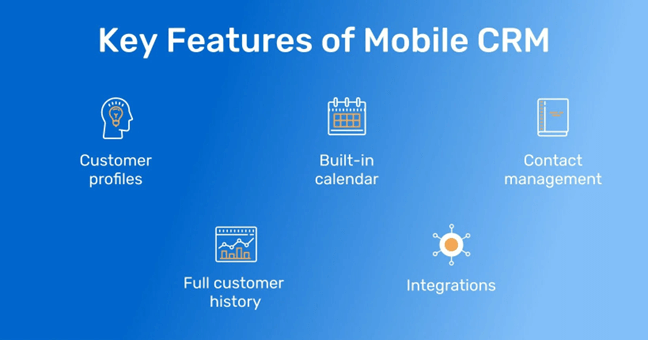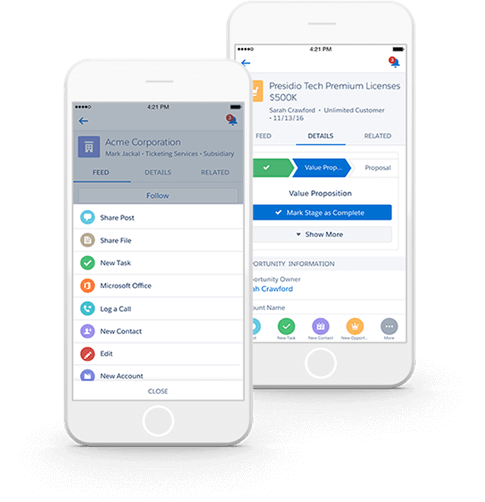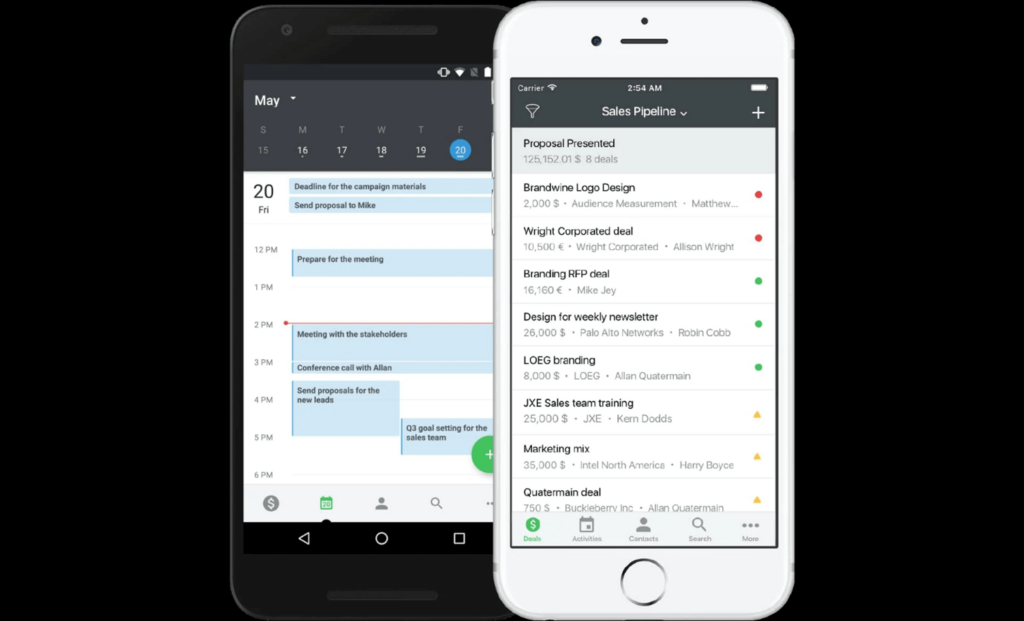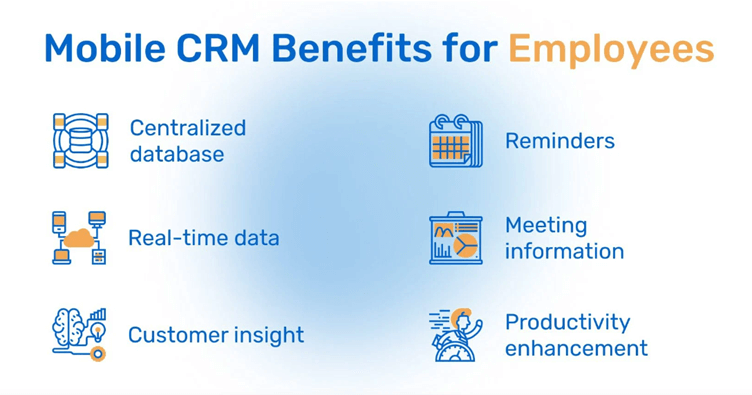With the significant shift of internet users from desktop to mobile devices, the demand for real-time information accessible from anywhere has become the norm. This transition is reflected in the increasing proportion of global internet traffic originating from mobile devices, which surged from 0.7% in 2009 to a staggering 52.99% in 2017. And this trend shows no signs of slowing down.
How a Mobile CRM Benefits Your Business?
To keep up with this evolving landscape, a CRM system must adapt and cater to the mobile-centric needs of businesses and their users. Enter the mobile CRM, which empowers users to access critical business data regardless of their location. It enables them to effectively run their business on the go, eliminating the constraints of being tied to a desktop computer.
Mobile CRMs offer businesses the convenience of effortlessly managing and nurturing customer relationships. By effectively monitoring customer interactions and history, sales professionals and businesses can enhance their service delivery and maximize sales opportunities.
Unlike their desktop counterparts, mobile CRMs provide increased flexibility by enabling businesses to access customer information anytime, anywhere. This accessibility proves invaluable to various industries, facilitating seamless customer relationship management and fostering improved connections.
By embracing mobile CRMs, businesses can streamline their operations and take advantage of the convenience they offer. This translates into more efficient management and enhancement of customer relationships, ultimately leading to increased sales and overall business growth.

By embracing mobile CRM solutions, businesses can harness the power of real-time information and capitalize on opportunities as they arise. Whether it’s managing customer relationships, tracking sales pipelines, or staying updated on important business metrics, a mobile CRM ensures that users have the necessary tools and data at their fingertips, no matter where they are.
Advantages of Mobile CRM
Mobile CRM has several advantages for businesses:
Real-time CRM data:
Mobile CRM platforms provide access to up-to-date information about your sales pipeline, urgent needs, and salesperson activity. You can view the same information as you would on a CRM dashboard, ensuring you have the latest insights and can make informed decisions.
On-the-go data:
With mobile CRM, you and your employees can access data from anywhere. Whether you are moving between locations or attending conferences, there are no limitations on accessing your CRM data. This flexibility allows your sales, marketing, and customer service teams to continue working effectively, even when they are on the move or working remotely.
Better sales processes and customer service:
Mobile CRM enables quick and responsive customer service and sales processes. If a prospect reaches out with a question, you can provide timely responses, avoiding missed opportunities. Similarly, when customers seek assistance, you can promptly address their needs, enhancing their satisfaction and loyalty.

Instant scheduling:
Mobile CRM provides full access to scheduling tools, allowing you to make instant calendar additions or adjustments. This capability reduces the likelihood of missed sales opportunities or appointments, ensuring efficient time management and better customer engagement.
Instant data analysis and reporting:
Mobile CRM empowers you to analyse recent data and generate reports with ease. You can quickly tap into your smartphone or tablet screen to gain valuable insights and share comprehensive reports, enabling faster decision-making and improved communication with stakeholders.
Data and contact updates:
With mobile CRM, your team can update information on the go. For example, after a successful meeting, a sales representative can immediately update a prospect’s contact card. This real-time data updating ensures that your CRM remains accurate and relevant, facilitating efficient collaboration within your team.
Remote file organization and sharing:
Sales, marketing, and customer service teams often handle numerous documents. Mobile CRM enables remote file organization and sharing, allowing team members to access, organize, and share documents from any location at any time. This capability promotes a more organized and cohesive team environment, enhancing collaboration and productivity.
Key Takeaway
Mobile CRM solutions offer numerous benefits, including access to real-time CRM data, improved communication with customers and work colleagues, and enhanced collaboration among team members.
What is Mobile CRM?
Mobile CRM refers to CRM software that offers full functionality and user-friendly experience on smartphones, tablets, and other mobile devices. It allows sales, customer service, and marketing teams to access and utilize the CRM software seamlessly, regardless of their location.
With mobile CRM, professionals can conveniently log in and use the CRM software on the go, making it a valuable tool for traveling sales representatives, conference attendees, remote work scenarios, and various other situations. This flexibility empowers teams to stay connected and productive, ensuring that important CRM tasks can be efficiently managed from any mobile device.

What is the Growth of Mobile CRM?
The growth of mobile CRM is closely tied to the increasing popularity of mobile apps in the market. As more users prefer to access their data and interact with businesses through mobile devices, the demand for mobile CRM solutions has risen significantly.
Research and statistics indicate that businesses leveraging mobile applications experience notable benefits, including an average increase of 87% in sales and a 74% improvement in customer satisfaction.
The mobile app market itself is projected to exhibit strong growth, with a compound annual growth rate (CAGR) of 18.40% expected from 2019 to 2026. This growth is primarily driven by the growing consumer demand for mobile apps across various industries.
Furthermore, the demand for mobile CRM solutions is anticipated to surge at a CAGR of 10.4% from 2022 to 2029, especially in sectors like finance and healthcare, where mobile CRM adoption is widespread.
One of the contributing factors to the growth of mobile CRM is its flexibility in pricing compared to traditional CRM solutions. Companies are increasingly recognizing the value they can derive from their investments in mobile CRM, making it an attractive option for many businesses.
Things to consider for implementing mobile CRM
When implementing a mobile CRM for your company, consider the following:
Consider your entire team: Explore how the mobile CRM can benefit not only sales, marketing, and customer service teams but also other departments like HR or logistics. Ensure that your mobile CRM facilitates communication and information sharing across all departments.
Define your objectives: Clearly define the specific goals you want to achieve with your mobile CRM. Identify the key advantages it will provide, such as supporting remote work, facilitating communication, or enabling easy data access and reporting.
Look at the bigger technological picture: Consider the broader technological implications of implementing a mobile CRM. Evaluate the security risks and work-life balance concerns associated with using personal devices. It may be necessary to provide work smartphones or tablets and implement security measures to protect company data.
Consider offline functionality: Determine if your mobile CRM can handle offline usage. Assess its ability to facilitate reporting and data analysis without real-time updates and whether it can store offline updates for syncing once the device reconnects to the internet.
Prioritize flexibility: Choose a mobile CRM solution that offers flexibility and scalability. Ensure it can adapt to changing business needs, such as supporting international growth with multilingual and multicurrency capabilities. Integration with other platforms and the ability to scale across departments are also important factors to consider.
Why Mobile CRM is important for employees?
Gone are the days when office employees were confined to their desks. Nowadays, work is no longer limited to a specific location. Sales team members are constantly on the move, visiting different offices and meeting with potential clients. Field agents require access to schedules and work orders even when they’re away from the office.
The advancement of technology has transformed traditional office jobs, making them more productive and efficient. With the option to access work remotely, employees are no longer restricted to the confines of an office space.
Research has even shown that companies can gain an additional 240 hours of work annually when employees utilize mobile devices for work-related purposes.
The power of mobile smart devices lies in the freedom they provide to users. Whether employees are in a different building or a different country, they can still access the same data.
This eliminates compatibility issues related to platforms and fosters a more collaborative work environment. All departments within the organization can seamlessly access and share information, promoting teamwork and enhancing overall productivity.
The flexibility and connectivity offered by mobile devices enable employees to work from wherever they find most suitable. Whether it’s on the go, at a client’s site, or remotely from home, employees can stay connected, access necessary data, and contribute to the success of the organization.
This shift in work dynamics has revolutionized the modern workplace, breaking down geographical barriers and enabling a more agile and collaborative work culture.

Why Mobile CRM is important for customers?
The availability of mobile CRM not only brings benefits to employees in terms of flexibility and productivity but also has a significant impact on customer satisfaction and service quality.
With a mobile CRM app, organizations can ensure that their customers always receive the best service. Employees have access to real-time updates and essential information, empowering them to provide clients with accurate and reliable information promptly.
This enables them to address customer queries, resolve issues, and deliver personalized experiences, enhancing overall customer satisfaction.
Even employees who are not directly involved in customer interactions can utilize mobile CRM to manage schedules, perform data analysis, generate reports, and organize important files.
By having all these capabilities within a single secure location, employees can work efficiently and collaboratively, resulting in improved service delivery and better outcomes for customers.
Mobile CRM enables organizations to streamline processes, improve communication, and enhance overall operational efficiency. It allows employees to access critical customer data and insights on the go, facilitating informed decision-making and enabling proactive engagement with customers.
This level of responsiveness and accessibility helps build trust, loyalty, and long-term relationships with customers.
Conclusion
When selecting a mobile CRM solution, it is important to carefully consider your specific business needs, the teams involved, and the importance you place on usability.
By understanding the unique requirements of your business, you can identify the features and functionalities that are crucial for your mobile CRM. Consider the specific goals, structure, and interests of your organization to ensure that the chosen solution aligns with your overall business objectives.
The adoption of mobile CRM solutions has become increasingly vital for businesses in today’s mobile-centric world. As internet traffic from mobile devices continues to surge, the demand for real-time information and flexibility in accessing customer data has become the norm. Mobile CRMs offer businesses the convenience of managing and nurturing customer relationships effortlessly, regardless of their location.
Mobile CRM empowers businesses to efficiently manage customer relationships, access real-time data, and deliver exceptional customer services, so businesses can stay ahead of the curve, drive growth, and foster long-term success.

